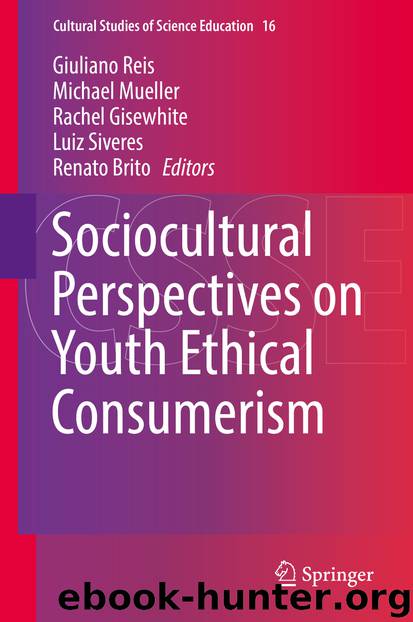Sociocultural Perspectives on Youth Ethical Consumerism by Giuliano Reis Michael Mueller Rachel Gisewhite Luiz Siveres & Renato Brito

Author:Giuliano Reis, Michael Mueller, Rachel Gisewhite, Luiz Siveres & Renato Brito
Language: eng
Format: epub
Publisher: Springer International Publishing, Cham
8.4 Caring for Land and People: Attending to the Ecological and Economic Dimensions of Sustainability
Consider how in the two case studies students engaged with ethical dimensions of caring for land and people. What we have learned from youth and educators in our research is that care and empathy for land and people can be fostered within school curricula and aid in disrupting the ideology of consumerism. In the case studies, we see youth begin to articulate and carry out more ethical economic and environmental practices in personal, school, and community settings.
In the coal mining example, we see how students came to better understand the ethical and environmental impacts of nonrenewable energy consumption through a case study approach of the Peabody Coal operation. Central to this experience was interacting with community members who had been involved in organizing against the operation, as well as seeing first–hand how coal mining has negatively impacted historically marginalized Native populations in the Southwest. Students also explored traditional Indigenous ethical perspectives on land use – namely, water as sacred. This case study provided students with yet another example of how unfettered consumption has dire consequences for land and people – and those consequences are disproportionately severe for economically oppressed people. Through this investigation, students experienced opportunities to develop empathy for marginalized communities outside their own, while also connecting the experiences of others to struggles they themselves face as residents of low–income neighborhoods. Ms. Bell, the science teacher, then helped students brainstorm ways to use the Peabody Coal case study as a context for reflection and action in their own school, home, and community. Students were encouraged to see connections between caring for land and people and ethical engagement with economic and environmental processes as interrelated and inseparable.
Within the youth–authored sustainability projects, we saw a variety of ways in which consumption practices were positioned in relation to both economic and environmental sustainability. One of the strongest themes that emerged across multiple sustainability projects was the integration of economic and consumer practices alongside environmental sustainability. In the sustainability projects described above, environmental sustainability was positioned as a significant – but not as the only – defining characteristic for the youth’s projects. Instead, youth and their teacher viewed significant economic factors related to the process of consumption as necessary and interrelated aspects of pursuing environmental sustainability. Their teacher fostered this integration in the project’s design, which stated “There is evidence that people agree that we need to live more sustainably but don’t always act in a way that leads to sustainability of the earth’s natural and human systems.” As the projects were enacted, youth wove ethical and sustainable forms of consumption into their projects as they positioned consumption through multiple dimensions of caring for land and people. Youth also demonstrated caring for people through care for students’ health and well–being with organic food consumption, care for the economic survival of their local community through local consumerism at an inner–city market or growing one’s own food, and care for personal economic well–being through selling the goods they created.
Download
This site does not store any files on its server. We only index and link to content provided by other sites. Please contact the content providers to delete copyright contents if any and email us, we'll remove relevant links or contents immediately.
The Art of Coaching Workbook by Elena Aguilar(51201)
Trainspotting by Irvine Welsh(21668)
Twilight of the Idols With the Antichrist and Ecce Homo by Friedrich Nietzsche(18635)
Fangirl by Rainbow Rowell(9254)
Periodization Training for Sports by Tudor Bompa(8274)
Change Your Questions, Change Your Life by Marilee Adams(7783)
This Is How You Lose Her by Junot Diaz(6889)
Asking the Right Questions: A Guide to Critical Thinking by M. Neil Browne & Stuart M. Keeley(5775)
Grit by Angela Duckworth(5615)
Red Sparrow by Jason Matthews(5476)
Paper Towns by Green John(5191)
Room 212 by Kate Stewart(5125)
Ken Follett - World without end by Ken Follett(4734)
Housekeeping by Marilynne Robinson(4449)
The Sports Rules Book by Human Kinetics(4388)
Papillon (English) by Henri Charrière(4274)
Double Down (Diary of a Wimpy Kid Book 11) by Jeff Kinney(4273)
The Motorcycle Diaries by Ernesto Che Guevara(4102)
Exercise Technique Manual for Resistance Training by National Strength & Conditioning Association(4072)
